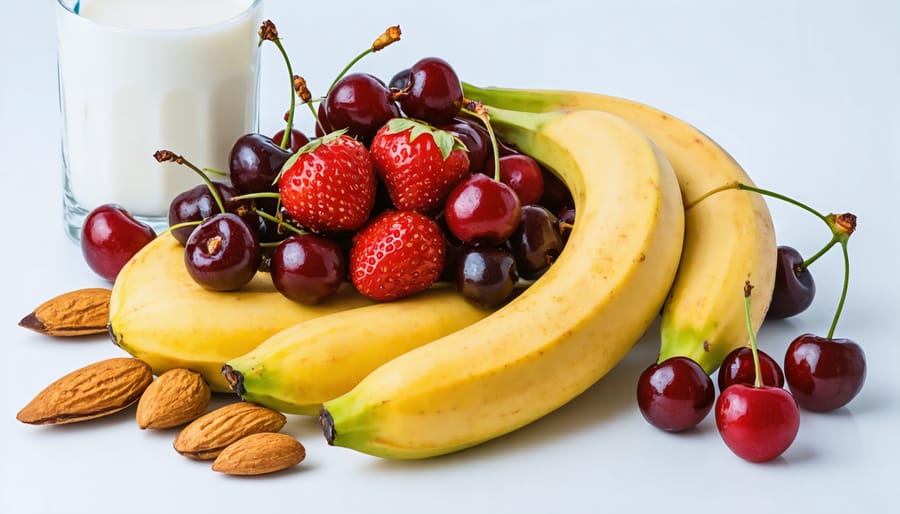The food choices you make throughout the day shape your child’s sleep quality – a factor that’s crucial for mental health and development. Simple dietary adjustments, like serving magnesium-rich foods such as bananas and almonds at dinner, can transform restless nights into peaceful sleep. Time meals strategically, keeping dinner at least two hours before bedtime, and limit sugar-heavy snacks after 3 PM to prevent sleep disruption. Watch for hidden caffeine in chocolate, sodas, and flavored drinks that might be keeping your little one awake. Understanding this connection between diet and sleep empowers you to make informed choices that support your child’s rest naturally, without relying on supplements or medications. Whether you’re dealing with bedtime resistance or midnight wake-ups, the solution might be as close as your kitchen.
How Food Timing Affects Your Child’s Sleep

Optimal Dinner Times
Timing your child’s dinner can significantly impact their sleep quality and overall bedtime routines. As a general guideline, children should eat their last main meal 2-3 hours before bedtime. This allows enough time for proper digestion while ensuring they’re not going to bed hungry.
For most families, serving dinner between 5:30 PM and 6:30 PM works well, especially if children go to bed between 8:00 PM and 9:00 PM. This timing helps prevent the discomfort of lying down with a full stomach, which can interfere with falling asleep. It also gives your child’s body time to properly process the meal and begin naturally producing sleep-inducing hormones.
If your family schedule requires a later dinner, try to keep portions moderate and choose easily digestible foods. Remember that every child is different, so observe how your little one responds to different meal times and adjust accordingly.
Smart Snacking Before Bed
Feeling hungry before bedtime is normal, especially for growing children, but timing and food choices matter. A light snack about an hour before bed can help prevent nighttime hunger without disrupting sleep. The key is choosing foods that combine complex carbohydrates with a small amount of protein.
Great bedtime snack options include whole grain crackers with cheese, a small bowl of low-sugar cereal with milk, or banana slices with a tablespoon of peanut butter. These combinations provide steady energy throughout the night without causing blood sugar spikes that could interfere with sleep.
Avoid large portions, sugary treats, or heavy foods that could cause discomfort. If your child regularly asks for bedtime snacks, consider adjusting their dinner time or portion sizes. Remember that each child’s needs are different, so observe how various snacks affect your child’s sleep quality and adjust accordingly.
As one parent shared with us, “We discovered that a small whole grain toast with almond butter helps our daughter sleep through the night without stomach growling waking her up.”
Sleep-Promoting Foods for Children
Natural Sleep Helpers
Nature has provided us with several foods that can help support our children’s sleep quality benefits. Tryptophan, found in foods like turkey, milk, and bananas, helps produce serotonin and melatonin – the hormones that regulate sleep. A small bedtime snack combining these foods with complex carbohydrates, like whole grain crackers or oatmeal, can help your child feel naturally drowsy.
Magnesium-rich foods are another sleep helper. Foods like almonds, pumpkin seeds, and leafy greens can help calm the nervous system and promote restful sleep. Consider adding these to your child’s evening meal or as a light snack.
Other sleep-supporting nutrients include calcium (found in dairy products and fortified plant milk), vitamin B6 (in sweet potatoes and chickpeas), and potassium (in bananas and avocados). These nutrients work together to support your child’s natural sleep-wake cycle.
Remember to serve these foods at least an hour before bedtime to allow for comfortable digestion. A light combination of these natural sleep helpers can make bedtime more peaceful for everyone.

Building a Sleep-Friendly Menu
Creating a sleep-friendly menu doesn’t have to be complicated. Start by planning dinner around foods rich in sleep-promoting nutrients like tryptophan, magnesium, and complex carbohydrates. Good choices include whole grain pasta, lean turkey, fish, or chickpeas, paired with colorful vegetables.
Timing matters just as much as food choices. Try to serve dinner at least 2-3 hours before bedtime to allow proper digestion. If your child needs a bedtime snack, keep it light and combine complex carbs with a small amount of protein – think whole grain crackers with a slice of cheese or banana with a tablespoon of peanut butter.
Consider limiting certain foods in the evening hours. Sugary treats, caffeine-containing foods (including chocolate), and heavily processed snacks can interfere with sleep quality. Instead, opt for calming beverages like warm milk or caffeine-free herbal tea.
Remember that every child is different, so observe how various foods affect your child’s sleep patterns and adjust accordingly. Keep a food diary for a week to identify any connections between certain foods and sleep difficulties.

Foods That Disrupt Sleep
Hidden Caffeine Sources
While most parents are aware that coffee and energy drinks contain caffeine, many other foods and beverages can secretly add to your child’s daily caffeine intake. Chocolate, particularly dark chocolate, contains significant amounts of caffeine – even a small chocolate bar can affect sensitive sleepers. Some ice creams and frozen yogurts, especially those with coffee or chocolate flavors, pack a surprising caffeine punch.
Be cautious with sodas beyond just cola varieties; many clear sodas and root beer contain caffeine. Even some orange and cream sodas might include it. Watch out for “energy-boosting” snacks and protein bars, which often contain hidden caffeine from sources like guarana or green tea extract.
Some surprising sources include hot chocolate, chocolate-flavored cereals, and even certain flavored waters. Even some over-the-counter medications contain caffeine. To help your child sleep better, check labels carefully, especially in the afternoon and evening hours. When in doubt, contact the manufacturer or consult with your pediatrician about specific products you’re unsure about.
Remember that children are more sensitive to caffeine than adults, so even small amounts can impact their sleep quality significantly.
Sugar’s Impact on Sleep
While sugar can give children a quick burst of energy, its impact on sleep quality is significant. Many parents notice their children have trouble settling down after consuming sugary treats, especially close to bedtime. This isn’t just a coincidence – research shows that high sugar intake can disrupt natural sleep patterns and make it harder to get restful sleep.
When children consume sugar, their blood sugar levels spike and then crash, which can cause them to wake up during the night. This roller coaster effect disrupts their sleep cycle and may lead to restlessness, night wakings, and difficulty falling asleep. Dr. Sarah Chen, a pediatric sleep specialist, explains, “Sugar consumption before bed can reduce the production of melatonin, our natural sleep hormone.”
To help your child sleep better, try limiting sugary foods and drinks to earlier in the day. Instead of sweet desserts before bedtime, offer sleep-friendly snacks like banana slices with almond butter or whole-grain crackers. Remember, it’s not about completely eliminating treats, but rather about timing them wisely to support healthy sleep patterns.
Making these small adjustments to your child’s evening routine can lead to more peaceful nights and better-rested mornings for the whole family.
Special Dietary Considerations
Food Sensitivities and Sleep
Food sensitivities can significantly impact your child’s sleep quality, even if the symptoms aren’t immediately obvious. Many parents are surprised to learn that their little one’s restless nights might be connected to what they’re eating during the day. Common food sensitivities that can affect sleep include dairy, gluten, and certain food additives.
For example, Sarah, a mother of two, noticed her 6-year-old son was consistently waking up throughout the night. After working with their pediatrician, they discovered he had a mild dairy sensitivity that was disrupting his sleep. Simply adjusting his evening snacks made a remarkable difference in his sleep quality.
Signs that food sensitivities might be affecting your child’s sleep include:
– Frequent night waking
– Tummy discomfort at bedtime
– Restless sleep
– Morning fatigue despite adequate sleep hours
– Unexplained irritability at bedtime
If you suspect food sensitivities are affecting your child’s sleep, keep a food and sleep diary for two weeks. Note what they eat and how they sleep each night. This information can be invaluable when discussing concerns with your healthcare provider. Remember, every child is different, and what affects one child’s sleep may not affect another’s. Working with a healthcare professional can help identify specific triggers and develop an appropriate plan for your child.
Managing Evening Hunger
Many children experience hunger before bedtime, which can be both frustrating for parents and disruptive to a good night’s sleep. The key is finding the right balance between preventing hunger and avoiding heavy meals too close to bedtime.
A light, healthy snack about an hour before bedtime can help manage evening hunger without interfering with sleep. Good options include a small bowl of whole-grain cereal with milk, yogurt with berries, or whole-grain crackers with cheese. These combinations provide a mix of complex carbohydrates and protein that can help maintain stable blood sugar levels throughout the night.
Watch out for common bedtime hunger triggers, such as irregular dinner times or insufficient protein at dinner. If your child consistently feels hungry at bedtime, try adjusting dinner portions or timing. Some families find success with moving dinner slightly later or adding a protein-rich food to the evening meal.
Remember that thirst can sometimes be mistaken for hunger. Offer water throughout the evening, but limit liquids in the hour before bed to prevent nighttime bathroom trips. If your child’s evening hunger persists despite these strategies, consult with your pediatrician to ensure their overall daily nutrition needs are being met.
Making positive changes to your child’s diet can significantly improve their sleep quality, and even small adjustments can lead to meaningful results. Remember that every child is unique, and what works for one may not work for another. The key is to focus on establishing consistent meal times, choosing sleep-promoting foods, and avoiding sleep disruptors like caffeine and excessive sugar.
Don’t feel pressured to make all these changes at once. Start with one or two modifications that feel most manageable for your family. Perhaps begin by moving dinner earlier or swapping sugary bedtime snacks for more sleep-friendly options. As you notice improvements in your child’s sleep, you’ll feel more motivated to implement additional changes.
Be patient with yourself and your child during this process. There may be some resistance at first, but stay consistent and positive. Involve your child in the journey by explaining how different foods affect their body and sleep. Remember that creating healthy eating habits now will benefit your child’s sleep quality and overall well-being for years to come.
If you’re feeling overwhelmed, don’t hesitate to reach out to your pediatrician or a registered dietitian for personalized guidance. With time and dedication, you can help your child develop a healthy relationship with both food and sleep.







